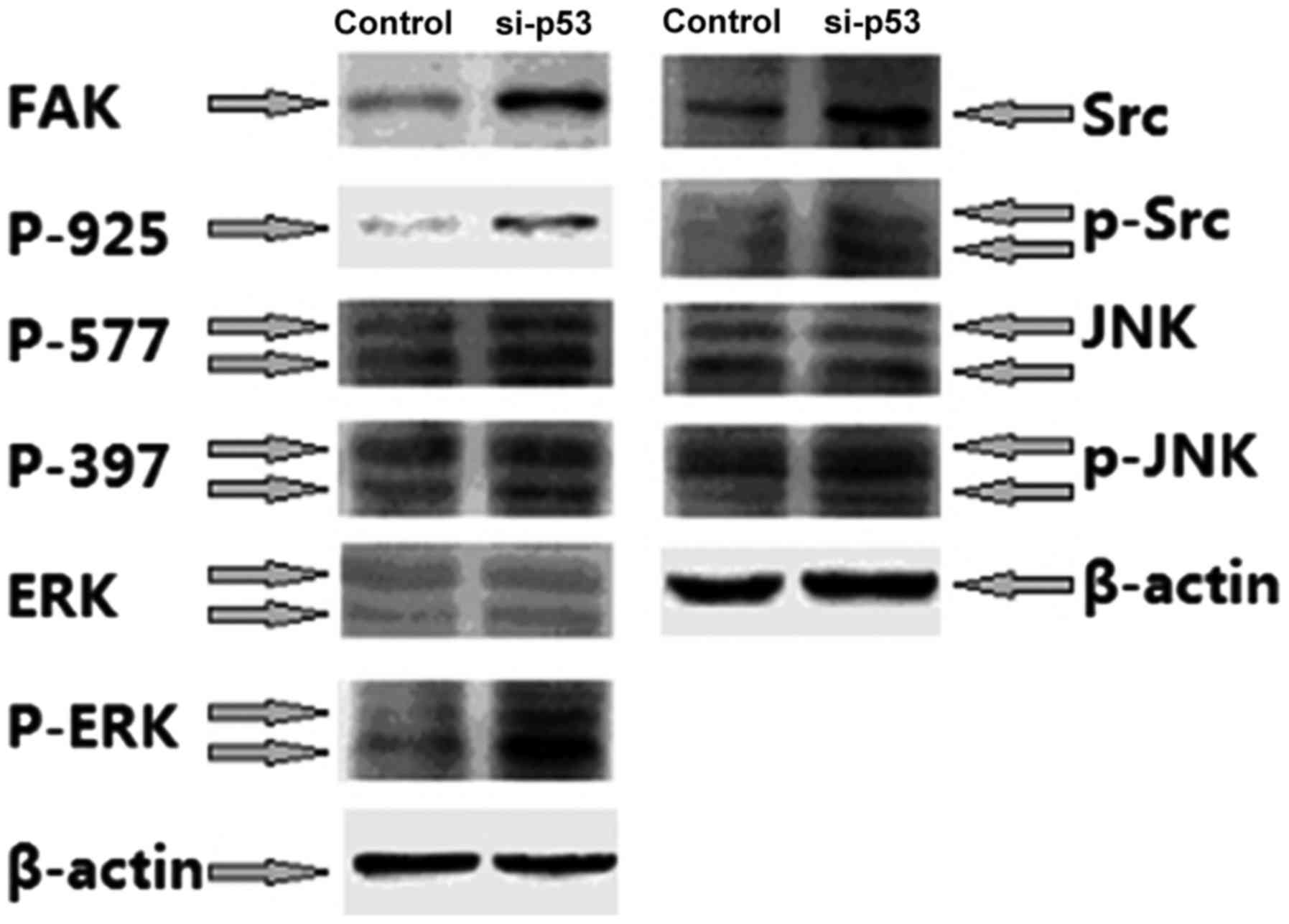|
1
|
Jemal A, Bray F, Center MM, Ferlay J, Ward
E and Forman D: Global cancer statistics. CA Cancer J Clin.
61:69–90. 2011. View Article : Google Scholar : PubMed/NCBI
|
|
2
|
Jiang T, Zhou C, Gu J, Liu Y, Zhao L, Li
W, Wang G, Li Y and Cai L: Enhanced therapeutic effect of cisplatin
on the prostate cancer in tumor-bearing mice by transfecting the
attenuated Salmonella carrying a plasmid co-expressing p53 gene and
mdm2 siRNA. Cancer Lett. 337:133–142. 2013. View Article : Google Scholar : PubMed/NCBI
|
|
3
|
Nande R, Greco A, Gossman MS, Lopez JP,
Claudio L, Salvatore M, Brunetti A, Denvir J, Howard CM and Claudio
PP: Microbubble-assisted p53, RB, and p130 gene transfer in
combination with radiation therapy in prostate cancer. Curr Gene
Ther. 13:163–174. 2013. View Article : Google Scholar : PubMed/NCBI
|
|
4
|
Wang Y, Zhang YX, Kong CZ, Zhang Z and Zhu
YY: Loss of P53 facilitates invasion and metastasis of prostate
cancer cells. Mol Cell Biochem. 384:121–127. 2013. View Article : Google Scholar : PubMed/NCBI
|
|
5
|
Sivoňová MK, Vilèková M, Kliment J,
Mahmood S, Jureèeková J, Dušenková S, Waczulíková I, Slezák P and
Dobrota D: Association of p53 and p21 polymorphisms with prostate
cancer. Biomed Rep. 3:707–714. 2015. View Article : Google Scholar : PubMed/NCBI
|
|
6
|
Gu J, Wang B, Liu Y, Zhong L, Tang Y, Guo
H, Jiang T, Wang L, Li Y and Cai L: Murine double minute 2 siRNA
and wild-type p53 gene therapy interact positively with zinc on
prostate tumours in vitro and in vivo. Eur J Cancer. 50:1184–1194.
2014. View Article : Google Scholar : PubMed/NCBI
|
|
7
|
Xie Q, Lu YY and Yi HF: Expression and
clinical significance of Caspase-3 and P53 in gastric cancer. Chin
J Gastroenterol Hepatol. 23:1287–1289. 2014.
|
|
8
|
Ha US, Bae WJ, Kim SJ, Yoon BI, Hong SH,
Lee JY, Hwang TK, Hwang SY, Wang Z and Kim SW: Anthocyanin induces
apoptosis of DU-145 cells in vitro and inhibits xenograft growth of
prostate cancer. Yonsei Med J. 56:16–23. 2015. View Article : Google Scholar : PubMed/NCBI
|
|
9
|
Teh BS and Ishiyama H: Hypofractionated
radiotherapy for prostate cancer. Lancet Oncol. 13:5–6. 2012.
View Article : Google Scholar : PubMed/NCBI
|
|
10
|
Henríquez-Hernández LA, Valenciano A,
Foro-Arnalot P, Álvarez-Cubero MJ, Cozar JM, Suárez-Novo JF,
Castells-Esteve M, Fernández-Gonzalo P, De-Paula-Carranza B, Ferrer
M, et al: Genetic variations in genes involved in testosterone
metabolism are associated with prostate cancer progression: A
Spanish multicenter study. Urol Oncol. 33:331.e1–e7. 2015.
View Article : Google Scholar
|
|
11
|
Thomsen FB, Folkvaljon Y, Garmo H,
Robinson D, Loeb S, Ingvar C, Lambe M and Stattin P: Risk of
malignant melanoma in men with prostate cancer: Nationwide,
population-based cohort study. Int J Cancer. 138:2154–2160. 2016.
View Article : Google Scholar : PubMed/NCBI
|
|
12
|
Alva A and Hussain M: Optimal
pharmacotherapeutic management of hormone-sensitive metastatic
prostate cancer. Drugs. 73:1517–1524. 2013. View Article : Google Scholar : PubMed/NCBI
|
|
13
|
Meek DW: Regulation of the p53 response
and its relationship to cancer. Biochem J. 469:325–346. 2015.
View Article : Google Scholar : PubMed/NCBI
|
|
14
|
Singh RD, Patel KR and Patel PS: p53
mutation spectrum and its role in prognosis of oral cancer
patients: A study from Gujarat, West India. Mutat Res. 783:15–26.
2016. View Article : Google Scholar : PubMed/NCBI
|
|
15
|
Zhang G, Li Z, Lin XM, Zhang JH, Cui Y and
Zhao X: Expression and significance of PTEN, S100A4 and p53 protein
in breast invasive ductal carcinoma. Guangdong Med J. 35:3510–3512.
2014.
|
|
16
|
Cai S and Han K: Research on expression
and importance of p53, p16 and VEGF-C in cervical cancer. J Gynecol
Obstet Biol Reprod (Paris). 44:639–645. 2015. View Article : Google Scholar : PubMed/NCBI
|
|
17
|
Thakur R, Trivedi R, Rastogi N, Singh M
and Mishra DP: Inhibition of STAT3, FAK and Src mediated signaling
reduces cancer stem cell load, tumorigenic potential and metastasis
in breast cancer. Sci Rep. 5:101942015. View Article : Google Scholar : PubMed/NCBI
|
|
18
|
Zhang H, Zhang SH, He HW, Zhang CX, Yu DK
and Shao RG: Downregulation of G3BPs inhibits the growth, migration
and invasion of human lung carcinoma H1299 cells by suppressing the
Src/FAK-associated signaling pathway. Cancer Gene Ther. 20:622–629.
2013. View Article : Google Scholar : PubMed/NCBI
|



















